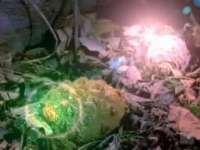Each plant requires a minimum of 16 elements or substances to its growth, and of 16 elements, three elements ( C, O, H) obtained from air and water. Meanwhile, 13 other elements obtained from the soil ( N, P, K, Ca, Mg, S, Cl, Fe, Mn, Cu, Zn, B, Mo) . To meet the 13 elements, only element taken six plants in bulk ( macro elements) , namely N, P, K, S, Ca, and Mg. The main nutrients that plants need a lot but the number or availibility often lacking or inadequate in the soil is N, P, and K. Therefore, the lack of availability in the soil than the crop needs above, the third element is added in the form of fertilizer. Soil can be defined as a natural medium for plant growth which consists of minerals, organic materials and living organisms. Excessive application of chemical fertilizers and continuously to bring negative impacts on soil and environmental conditions. But in reality, modern agriculture depends heavily on the use of chemicals such as fertilizers and pesticides to increase crop yields. Therefore, to reduce the negative impact, the organic fertilizer containing microbes ( biofertilizer) , including compost-enriched bacteria ( inoculant) can be used as an alternative or partner of the use of chemical fertilizers.
Biofertilizer as microbiological activity is not a common fertilizer ( inorganic chemistry) that directly improve soil fertility by adding nutrients to the soil. Biological or microbiological fertilizers add nutrients through natural processes, namely fixation of atmospheric nitrogen, making the material dissolved phosphorus, and stimulates plant growth through synthesis of substances that support plant growth. Microorganisms in microbiological fertilizer restore natural nutrient cycles of soil and organic material to form soil. Through the use of microbiological fertilizers, healthy plants can be grown while improving sustainability and soil health. Farmers need to re-use biological and organic fertilizer as an appropriate solution to minimize the adverse effects of chemical fertilizer use has been proven to have caused a variety of degenerative diseases ( diabetes mellitus, hypertension, etc.) .
For the sake of providing biological fertilizer, compost ( included in the category of organic fertilizer) is a carrier ( carrier) is wise to keep microbes. Biofertilizer ( microbes) do not provide nutrients for plants. So do not contain N, P, or K. In nature these microbes have a very important role for plants. Almost the entire process of nutrient uptake by plants is assisted by microbes. Can contain several types of microbes, such a role in the chain of N from the air, for example Azosprillium sp, Azotobacter sp, Rhizobium sp ( the nuts) , or there are also microbes that play a role in the biological fertilizer in the dissolution of P, such as Aspergillus and Penicillium sp sp. Enrich organic fertilizer ( compost) by microbes is actually a merge between the role of organic fertilizer - providing nutrients and ' vitamins' for plants, as well as providing ' food' for microbes in the biological fertilizer.
Biofertilizer is one very important ingredient in the effort to improve soil fertility. The use of biological fertilizers will not leave residue on the plant that is safe for human health. In addition, the use of biological fertilizer is expected to improve the health of the soil, grow the micro-organism ( microbe) , create a loose soil and foster animals ( worms) , spur growth and increased crop production. Fertilization by growing the biological content in the soil is then often referred to as organic farming, the land while seeking to preserve the interests of maintaining fertility in the long term or sustainable agriculture ( sustainability of agriculture) .
In regard to supporting sustainable agriculture above, in the category of material of biological or organic fertilizer ( compost) , CVSK isolate microbes ( probiotics) degrading garbage and various minerals for the continuity of modern composting, hygienic and quick. Microbial decomposers are compost activators Green Phoskko ® ( GP-1) and mineral bulking ( Bulking Agent) Green Phoskko ® ( GP-2) .
Technology composting ( composting technology) is becoming very important, especially to overcome the problems of garbage and waste ( organic) , particularly in urban areas, in commercial areas ( residential areas, malls, hotels, industrial estates, factories, etc.) , in social areas ( schools, hospitals, places of worship, etc.) as well as problems arising from the existence of organic waste ( food and beverage industry, as well as agricultural waste, sewage farms and plantations) .
PT CIPTA VISI SINAR KENCANA ( CVSK) ,
www.kencanaonline.com
IR. Sonson Garsoni
+ 62-81572527115
 | Pupuk Hayati l Bio Fertilizer l Bakteri Pengurai Organik l Aktivator Kompos - www.kencanaonline.com http://indomonster.com/pupuk_hayati/ |
- Contact Information
-
Name:
Mr. Sonson Garsoni, IR [Director/CEO/General Manager]
E-mail:
Homepage:
Phone Number:
Mobile Number:
Fax Number:
Address:Jl. Pungkur No. 115 B
Showroom & Bengkel Kencana, Jl Raya Banjaran No 222, Bandung Selatan 40376, Jawa Barat, + 62-812221160
Bandung 40251, Jawa Barat
Indonesia
- Average User Review
- There is no review for this company Write a review
Home
